Digital Business and Ecommerce Management
VerifiedAdded on 2023/06/12
|15
|4045
|456
AI Summary
This report discusses digital business and ecommerce management, including key trends, emerging business models, and strategic alliances. The report also evaluates the impact of cryptocurrency on businesses and provides insights on the use of digital transformation in a dynamic environment globally.
Contribute Materials
Your contribution can guide someone’s learning journey. Share your
documents today.
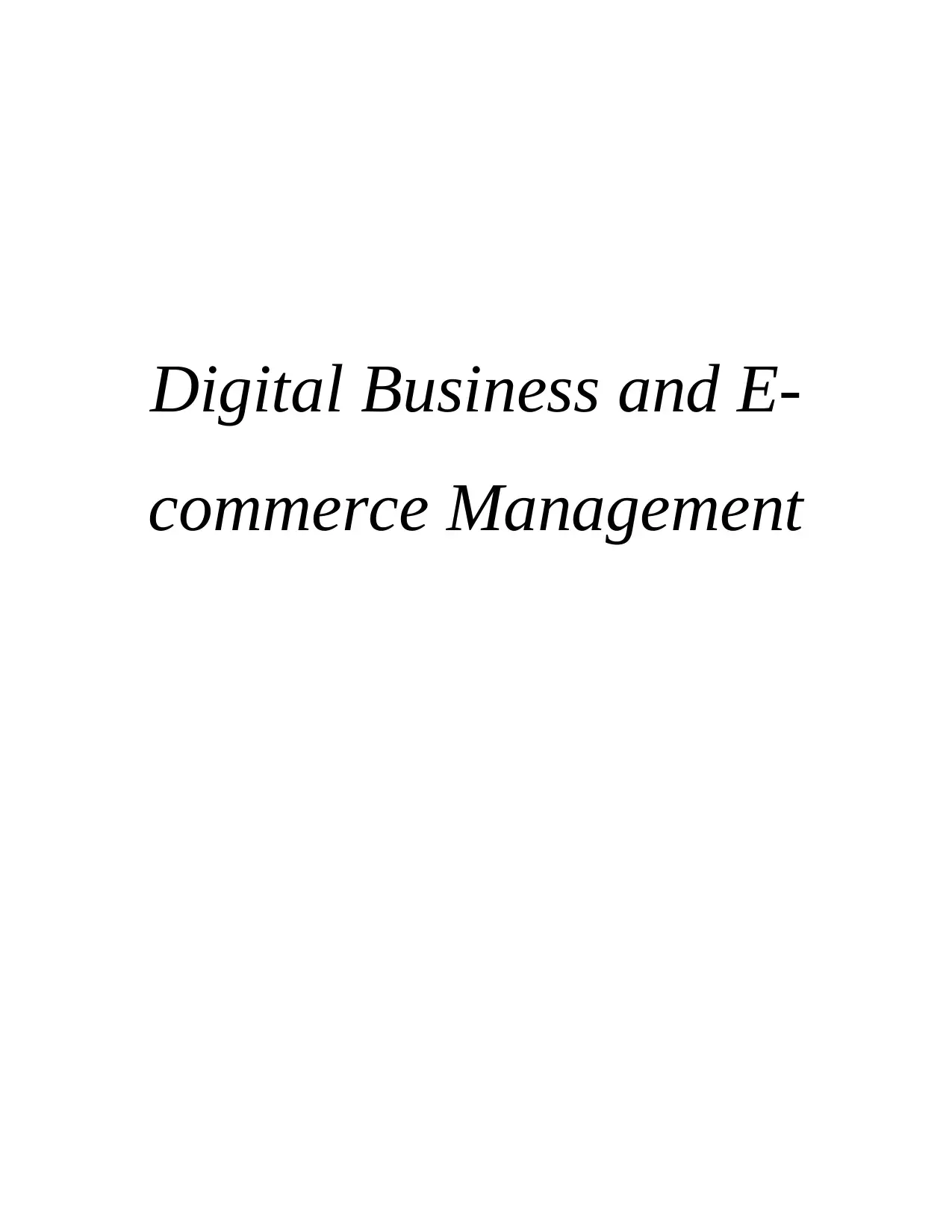
Digital Business and E-
commerce Management
commerce Management
Secure Best Marks with AI Grader
Need help grading? Try our AI Grader for instant feedback on your assignments.

EXECUTIVE SUMMARY
This project report is prepares with an aim to define varied strategies and practices in
relation to transformation of normal business operations to a virtual one. This report also
enlightens on the need of understanding strategic alliances and collaborative partnerships. This
also talks about benefits of cryptocurrency in relation to digital business.
This project report is prepares with an aim to define varied strategies and practices in
relation to transformation of normal business operations to a virtual one. This report also
enlightens on the need of understanding strategic alliances and collaborative partnerships. This
also talks about benefits of cryptocurrency in relation to digital business.
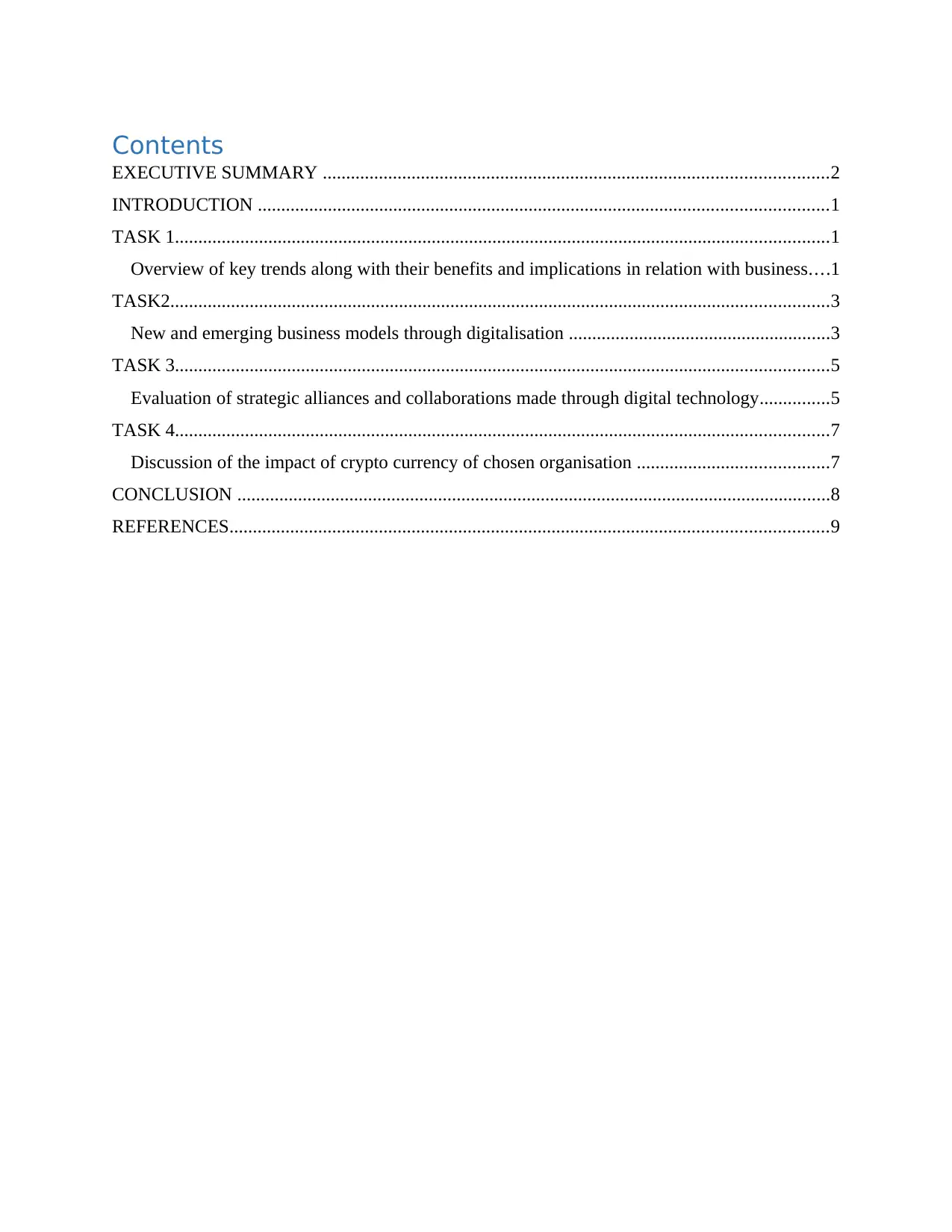
Contents
EXECUTIVE SUMMARY ............................................................................................................2
INTRODUCTION ..........................................................................................................................1
TASK 1............................................................................................................................................1
Overview of key trends along with their benefits and implications in relation with business....1
TASK2.............................................................................................................................................3
New and emerging business models through digitalisation ........................................................3
TASK 3............................................................................................................................................5
Evaluation of strategic alliances and collaborations made through digital technology...............5
TASK 4............................................................................................................................................7
Discussion of the impact of crypto currency of chosen organisation .........................................7
CONCLUSION ...............................................................................................................................8
REFERENCES................................................................................................................................9
EXECUTIVE SUMMARY ............................................................................................................2
INTRODUCTION ..........................................................................................................................1
TASK 1............................................................................................................................................1
Overview of key trends along with their benefits and implications in relation with business....1
TASK2.............................................................................................................................................3
New and emerging business models through digitalisation ........................................................3
TASK 3............................................................................................................................................5
Evaluation of strategic alliances and collaborations made through digital technology...............5
TASK 4............................................................................................................................................7
Discussion of the impact of crypto currency of chosen organisation .........................................7
CONCLUSION ...............................................................................................................................8
REFERENCES................................................................................................................................9

Secure Best Marks with AI Grader
Need help grading? Try our AI Grader for instant feedback on your assignments.
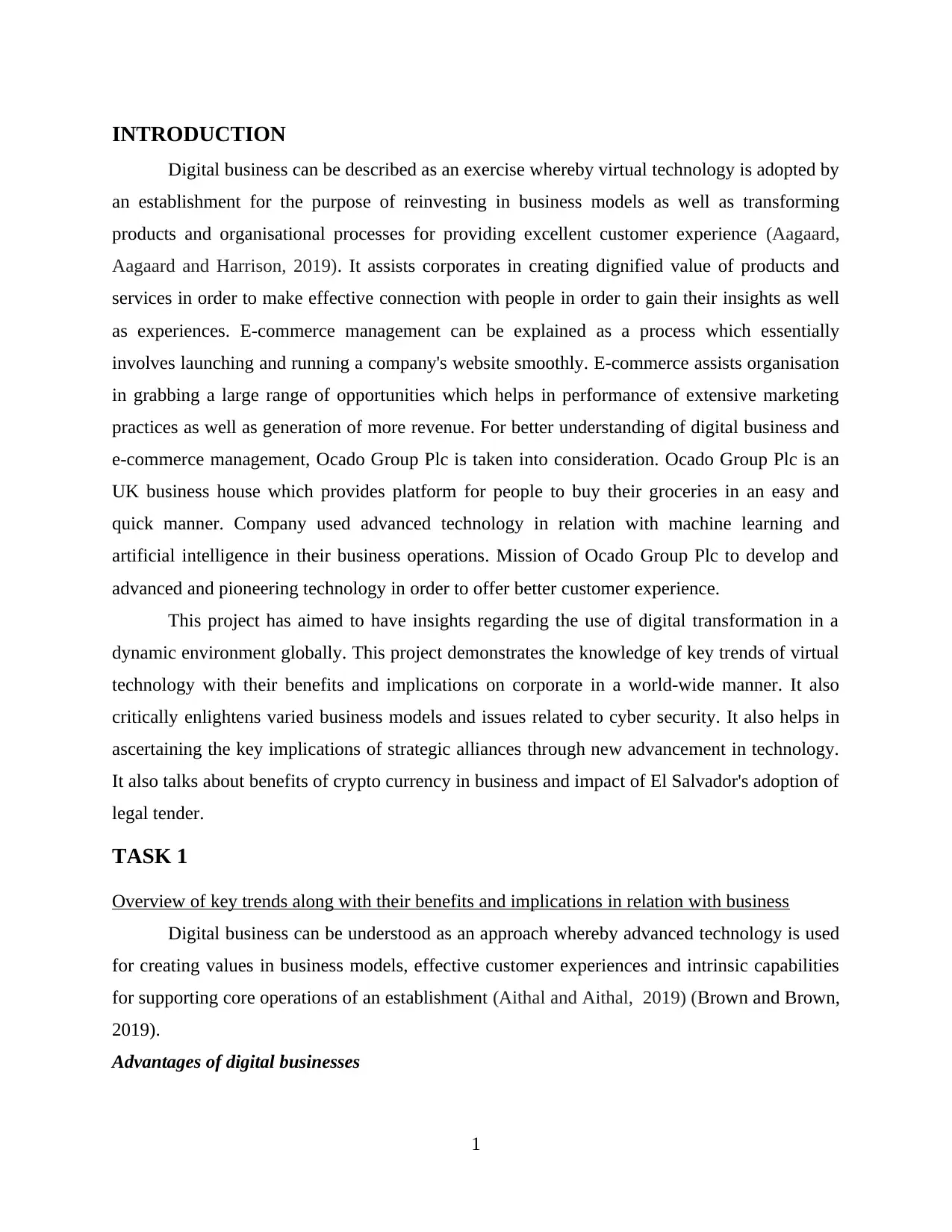
INTRODUCTION
Digital business can be described as an exercise whereby virtual technology is adopted by
an establishment for the purpose of reinvesting in business models as well as transforming
products and organisational processes for providing excellent customer experience (Aagaard,
Aagaard and Harrison, 2019). It assists corporates in creating dignified value of products and
services in order to make effective connection with people in order to gain their insights as well
as experiences. E-commerce management can be explained as a process which essentially
involves launching and running a company's website smoothly. E-commerce assists organisation
in grabbing a large range of opportunities which helps in performance of extensive marketing
practices as well as generation of more revenue. For better understanding of digital business and
e-commerce management, Ocado Group Plc is taken into consideration. Ocado Group Plc is an
UK business house which provides platform for people to buy their groceries in an easy and
quick manner. Company used advanced technology in relation with machine learning and
artificial intelligence in their business operations. Mission of Ocado Group Plc to develop and
advanced and pioneering technology in order to offer better customer experience.
This project has aimed to have insights regarding the use of digital transformation in a
dynamic environment globally. This project demonstrates the knowledge of key trends of virtual
technology with their benefits and implications on corporate in a world-wide manner. It also
critically enlightens varied business models and issues related to cyber security. It also helps in
ascertaining the key implications of strategic alliances through new advancement in technology.
It also talks about benefits of crypto currency in business and impact of El Salvador's adoption of
legal tender.
TASK 1
Overview of key trends along with their benefits and implications in relation with business
Digital business can be understood as an approach whereby advanced technology is used
for creating values in business models, effective customer experiences and intrinsic capabilities
for supporting core operations of an establishment (Aithal and Aithal, 2019) (Brown and Brown,
2019).
Advantages of digital businesses
1
Digital business can be described as an exercise whereby virtual technology is adopted by
an establishment for the purpose of reinvesting in business models as well as transforming
products and organisational processes for providing excellent customer experience (Aagaard,
Aagaard and Harrison, 2019). It assists corporates in creating dignified value of products and
services in order to make effective connection with people in order to gain their insights as well
as experiences. E-commerce management can be explained as a process which essentially
involves launching and running a company's website smoothly. E-commerce assists organisation
in grabbing a large range of opportunities which helps in performance of extensive marketing
practices as well as generation of more revenue. For better understanding of digital business and
e-commerce management, Ocado Group Plc is taken into consideration. Ocado Group Plc is an
UK business house which provides platform for people to buy their groceries in an easy and
quick manner. Company used advanced technology in relation with machine learning and
artificial intelligence in their business operations. Mission of Ocado Group Plc to develop and
advanced and pioneering technology in order to offer better customer experience.
This project has aimed to have insights regarding the use of digital transformation in a
dynamic environment globally. This project demonstrates the knowledge of key trends of virtual
technology with their benefits and implications on corporate in a world-wide manner. It also
critically enlightens varied business models and issues related to cyber security. It also helps in
ascertaining the key implications of strategic alliances through new advancement in technology.
It also talks about benefits of crypto currency in business and impact of El Salvador's adoption of
legal tender.
TASK 1
Overview of key trends along with their benefits and implications in relation with business
Digital business can be understood as an approach whereby advanced technology is used
for creating values in business models, effective customer experiences and intrinsic capabilities
for supporting core operations of an establishment (Aithal and Aithal, 2019) (Brown and Brown,
2019).
Advantages of digital businesses
1
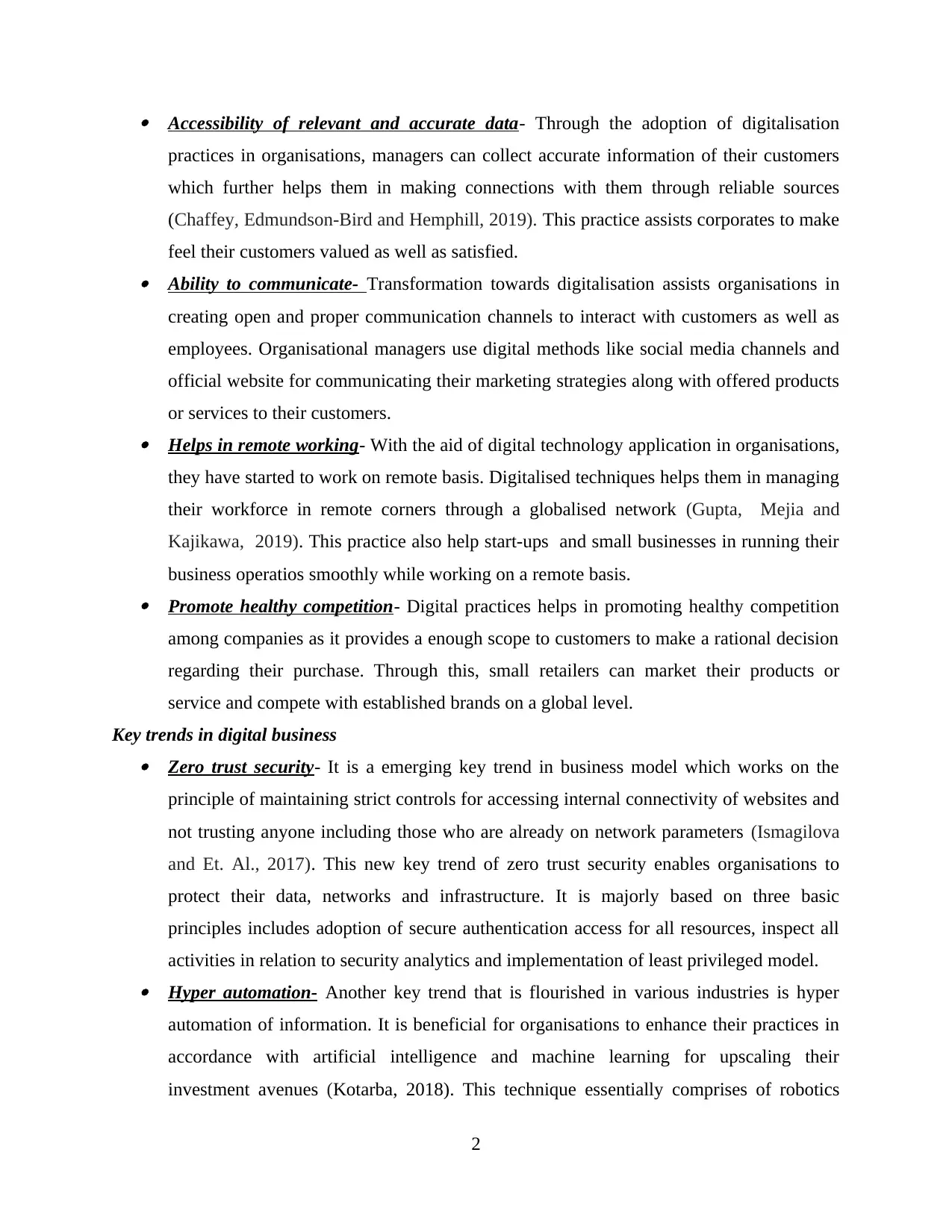
Accessibility of relevant and accurate data- Through the adoption of digitalisation
practices in organisations, managers can collect accurate information of their customers
which further helps them in making connections with them through reliable sources
(Chaffey, Edmundson-Bird and Hemphill, 2019). This practice assists corporates to make
feel their customers valued as well as satisfied. Ability to communicate- Transformation towards digitalisation assists organisations in
creating open and proper communication channels to interact with customers as well as
employees. Organisational managers use digital methods like social media channels and
official website for communicating their marketing strategies along with offered products
or services to their customers. Helps in remote working- With the aid of digital technology application in organisations,
they have started to work on remote basis. Digitalised techniques helps them in managing
their workforce in remote corners through a globalised network (Gupta, Mejia and
Kajikawa, 2019). This practice also help start-ups and small businesses in running their
business operatios smoothly while working on a remote basis. Promote healthy competition- Digital practices helps in promoting healthy competition
among companies as it provides a enough scope to customers to make a rational decision
regarding their purchase. Through this, small retailers can market their products or
service and compete with established brands on a global level.
Key trends in digital business Zero trust security- It is a emerging key trend in business model which works on the
principle of maintaining strict controls for accessing internal connectivity of websites and
not trusting anyone including those who are already on network parameters (Ismagilova
and Et. Al., 2017). This new key trend of zero trust security enables organisations to
protect their data, networks and infrastructure. It is majorly based on three basic
principles includes adoption of secure authentication access for all resources, inspect all
activities in relation to security analytics and implementation of least privileged model. Hyper automation- Another key trend that is flourished in various industries is hyper
automation of information. It is beneficial for organisations to enhance their practices in
accordance with artificial intelligence and machine learning for upscaling their
investment avenues (Kotarba, 2018). This technique essentially comprises of robotics
2
practices in organisations, managers can collect accurate information of their customers
which further helps them in making connections with them through reliable sources
(Chaffey, Edmundson-Bird and Hemphill, 2019). This practice assists corporates to make
feel their customers valued as well as satisfied. Ability to communicate- Transformation towards digitalisation assists organisations in
creating open and proper communication channels to interact with customers as well as
employees. Organisational managers use digital methods like social media channels and
official website for communicating their marketing strategies along with offered products
or services to their customers. Helps in remote working- With the aid of digital technology application in organisations,
they have started to work on remote basis. Digitalised techniques helps them in managing
their workforce in remote corners through a globalised network (Gupta, Mejia and
Kajikawa, 2019). This practice also help start-ups and small businesses in running their
business operatios smoothly while working on a remote basis. Promote healthy competition- Digital practices helps in promoting healthy competition
among companies as it provides a enough scope to customers to make a rational decision
regarding their purchase. Through this, small retailers can market their products or
service and compete with established brands on a global level.
Key trends in digital business Zero trust security- It is a emerging key trend in business model which works on the
principle of maintaining strict controls for accessing internal connectivity of websites and
not trusting anyone including those who are already on network parameters (Ismagilova
and Et. Al., 2017). This new key trend of zero trust security enables organisations to
protect their data, networks and infrastructure. It is majorly based on three basic
principles includes adoption of secure authentication access for all resources, inspect all
activities in relation to security analytics and implementation of least privileged model. Hyper automation- Another key trend that is flourished in various industries is hyper
automation of information. It is beneficial for organisations to enhance their practices in
accordance with artificial intelligence and machine learning for upscaling their
investment avenues (Kotarba, 2018). This technique essentially comprises of robotics
2
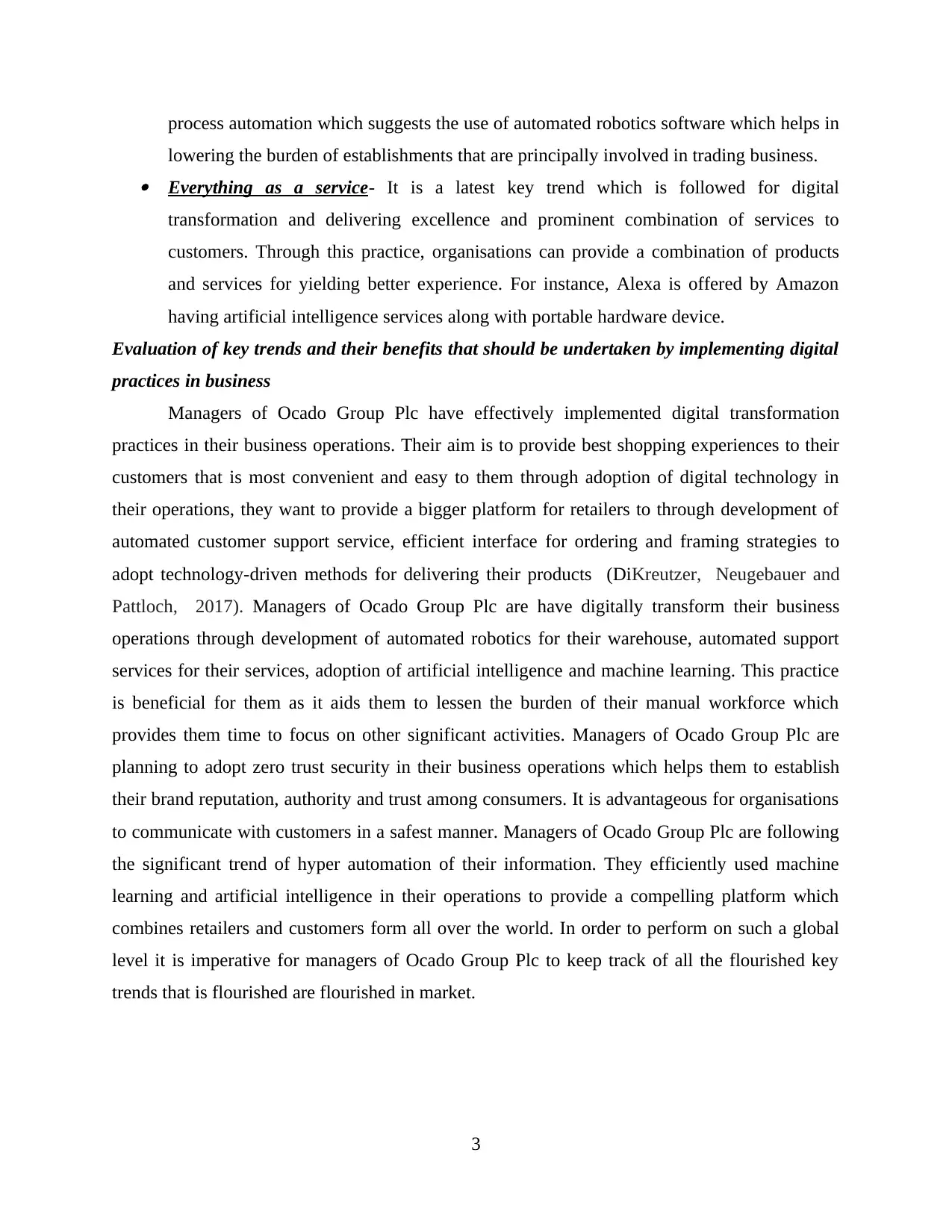
process automation which suggests the use of automated robotics software which helps in
lowering the burden of establishments that are principally involved in trading business. Everything as a service- It is a latest key trend which is followed for digital
transformation and delivering excellence and prominent combination of services to
customers. Through this practice, organisations can provide a combination of products
and services for yielding better experience. For instance, Alexa is offered by Amazon
having artificial intelligence services along with portable hardware device.
Evaluation of key trends and their benefits that should be undertaken by implementing digital
practices in business
Managers of Ocado Group Plc have effectively implemented digital transformation
practices in their business operations. Their aim is to provide best shopping experiences to their
customers that is most convenient and easy to them through adoption of digital technology in
their operations, they want to provide a bigger platform for retailers to through development of
automated customer support service, efficient interface for ordering and framing strategies to
adopt technology-driven methods for delivering their products (DiKreutzer, Neugebauer and
Pattloch, 2017). Managers of Ocado Group Plc are have digitally transform their business
operations through development of automated robotics for their warehouse, automated support
services for their services, adoption of artificial intelligence and machine learning. This practice
is beneficial for them as it aids them to lessen the burden of their manual workforce which
provides them time to focus on other significant activities. Managers of Ocado Group Plc are
planning to adopt zero trust security in their business operations which helps them to establish
their brand reputation, authority and trust among consumers. It is advantageous for organisations
to communicate with customers in a safest manner. Managers of Ocado Group Plc are following
the significant trend of hyper automation of their information. They efficiently used machine
learning and artificial intelligence in their operations to provide a compelling platform which
combines retailers and customers form all over the world. In order to perform on such a global
level it is imperative for managers of Ocado Group Plc to keep track of all the flourished key
trends that is flourished are flourished in market.
3
lowering the burden of establishments that are principally involved in trading business. Everything as a service- It is a latest key trend which is followed for digital
transformation and delivering excellence and prominent combination of services to
customers. Through this practice, organisations can provide a combination of products
and services for yielding better experience. For instance, Alexa is offered by Amazon
having artificial intelligence services along with portable hardware device.
Evaluation of key trends and their benefits that should be undertaken by implementing digital
practices in business
Managers of Ocado Group Plc have effectively implemented digital transformation
practices in their business operations. Their aim is to provide best shopping experiences to their
customers that is most convenient and easy to them through adoption of digital technology in
their operations, they want to provide a bigger platform for retailers to through development of
automated customer support service, efficient interface for ordering and framing strategies to
adopt technology-driven methods for delivering their products (DiKreutzer, Neugebauer and
Pattloch, 2017). Managers of Ocado Group Plc are have digitally transform their business
operations through development of automated robotics for their warehouse, automated support
services for their services, adoption of artificial intelligence and machine learning. This practice
is beneficial for them as it aids them to lessen the burden of their manual workforce which
provides them time to focus on other significant activities. Managers of Ocado Group Plc are
planning to adopt zero trust security in their business operations which helps them to establish
their brand reputation, authority and trust among consumers. It is advantageous for organisations
to communicate with customers in a safest manner. Managers of Ocado Group Plc are following
the significant trend of hyper automation of their information. They efficiently used machine
learning and artificial intelligence in their operations to provide a compelling platform which
combines retailers and customers form all over the world. In order to perform on such a global
level it is imperative for managers of Ocado Group Plc to keep track of all the flourished key
trends that is flourished are flourished in market.
3
Paraphrase This Document
Need a fresh take? Get an instant paraphrase of this document with our AI Paraphraser
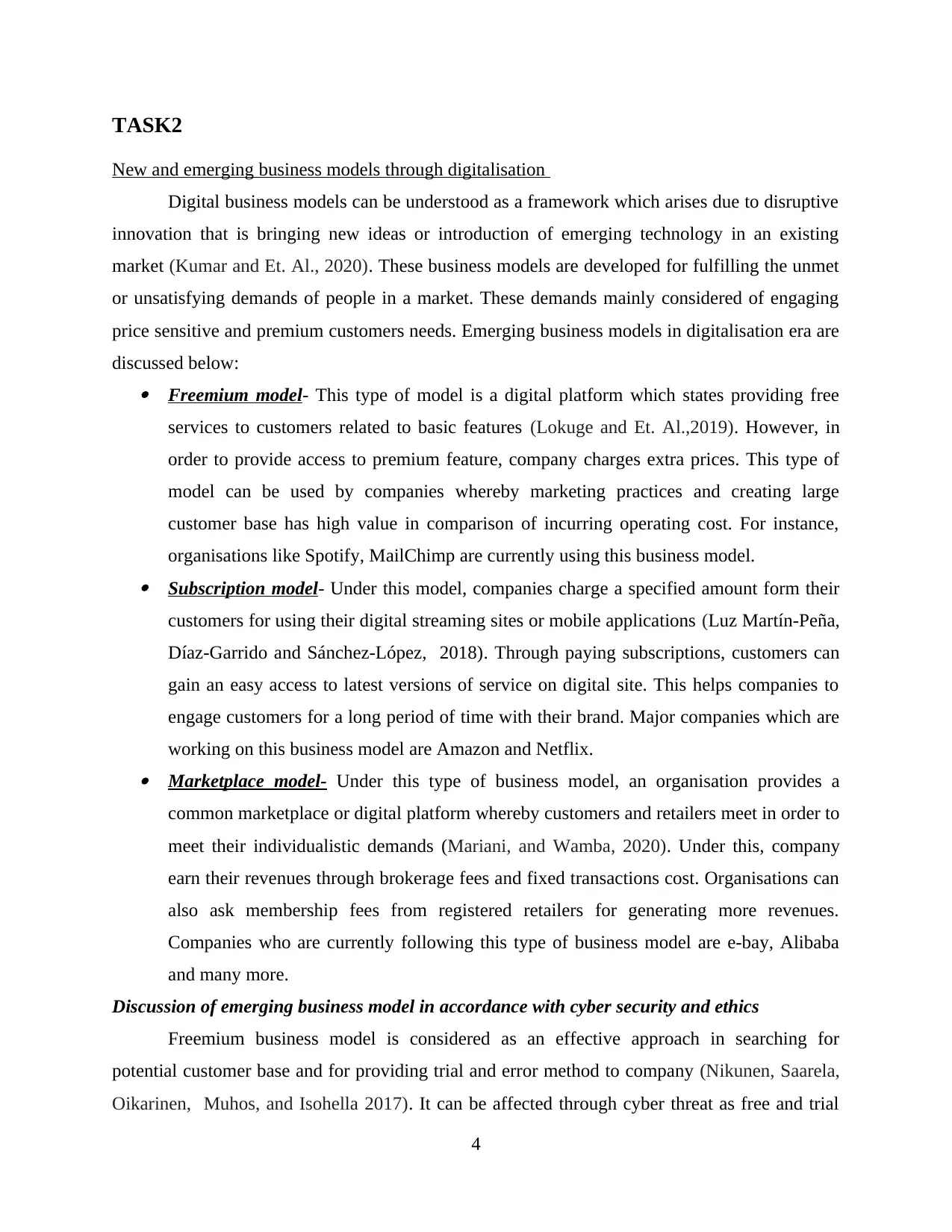
TASK2
New and emerging business models through digitalisation
Digital business models can be understood as a framework which arises due to disruptive
innovation that is bringing new ideas or introduction of emerging technology in an existing
market (Kumar and Et. Al., 2020). These business models are developed for fulfilling the unmet
or unsatisfying demands of people in a market. These demands mainly considered of engaging
price sensitive and premium customers needs. Emerging business models in digitalisation era are
discussed below: Freemium model- This type of model is a digital platform which states providing free
services to customers related to basic features (Lokuge and Et. Al.,2019). However, in
order to provide access to premium feature, company charges extra prices. This type of
model can be used by companies whereby marketing practices and creating large
customer base has high value in comparison of incurring operating cost. For instance,
organisations like Spotify, MailChimp are currently using this business model. Subscription model- Under this model, companies charge a specified amount form their
customers for using their digital streaming sites or mobile applications (Luz Martín‐Peña,
Díaz‐Garrido and Sánchez‐López, 2018). Through paying subscriptions, customers can
gain an easy access to latest versions of service on digital site. This helps companies to
engage customers for a long period of time with their brand. Major companies which are
working on this business model are Amazon and Netflix. Marketplace model- Under this type of business model, an organisation provides a
common marketplace or digital platform whereby customers and retailers meet in order to
meet their individualistic demands (Mariani, and Wamba, 2020). Under this, company
earn their revenues through brokerage fees and fixed transactions cost. Organisations can
also ask membership fees from registered retailers for generating more revenues.
Companies who are currently following this type of business model are e-bay, Alibaba
and many more.
Discussion of emerging business model in accordance with cyber security and ethics
Freemium business model is considered as an effective approach in searching for
potential customer base and for providing trial and error method to company (Nikunen, Saarela,
Oikarinen, Muhos, and Isohella 2017). It can be affected through cyber threat as free and trial
4
New and emerging business models through digitalisation
Digital business models can be understood as a framework which arises due to disruptive
innovation that is bringing new ideas or introduction of emerging technology in an existing
market (Kumar and Et. Al., 2020). These business models are developed for fulfilling the unmet
or unsatisfying demands of people in a market. These demands mainly considered of engaging
price sensitive and premium customers needs. Emerging business models in digitalisation era are
discussed below: Freemium model- This type of model is a digital platform which states providing free
services to customers related to basic features (Lokuge and Et. Al.,2019). However, in
order to provide access to premium feature, company charges extra prices. This type of
model can be used by companies whereby marketing practices and creating large
customer base has high value in comparison of incurring operating cost. For instance,
organisations like Spotify, MailChimp are currently using this business model. Subscription model- Under this model, companies charge a specified amount form their
customers for using their digital streaming sites or mobile applications (Luz Martín‐Peña,
Díaz‐Garrido and Sánchez‐López, 2018). Through paying subscriptions, customers can
gain an easy access to latest versions of service on digital site. This helps companies to
engage customers for a long period of time with their brand. Major companies which are
working on this business model are Amazon and Netflix. Marketplace model- Under this type of business model, an organisation provides a
common marketplace or digital platform whereby customers and retailers meet in order to
meet their individualistic demands (Mariani, and Wamba, 2020). Under this, company
earn their revenues through brokerage fees and fixed transactions cost. Organisations can
also ask membership fees from registered retailers for generating more revenues.
Companies who are currently following this type of business model are e-bay, Alibaba
and many more.
Discussion of emerging business model in accordance with cyber security and ethics
Freemium business model is considered as an effective approach in searching for
potential customer base and for providing trial and error method to company (Nikunen, Saarela,
Oikarinen, Muhos, and Isohella 2017). It can be affected through cyber threat as free and trial
4
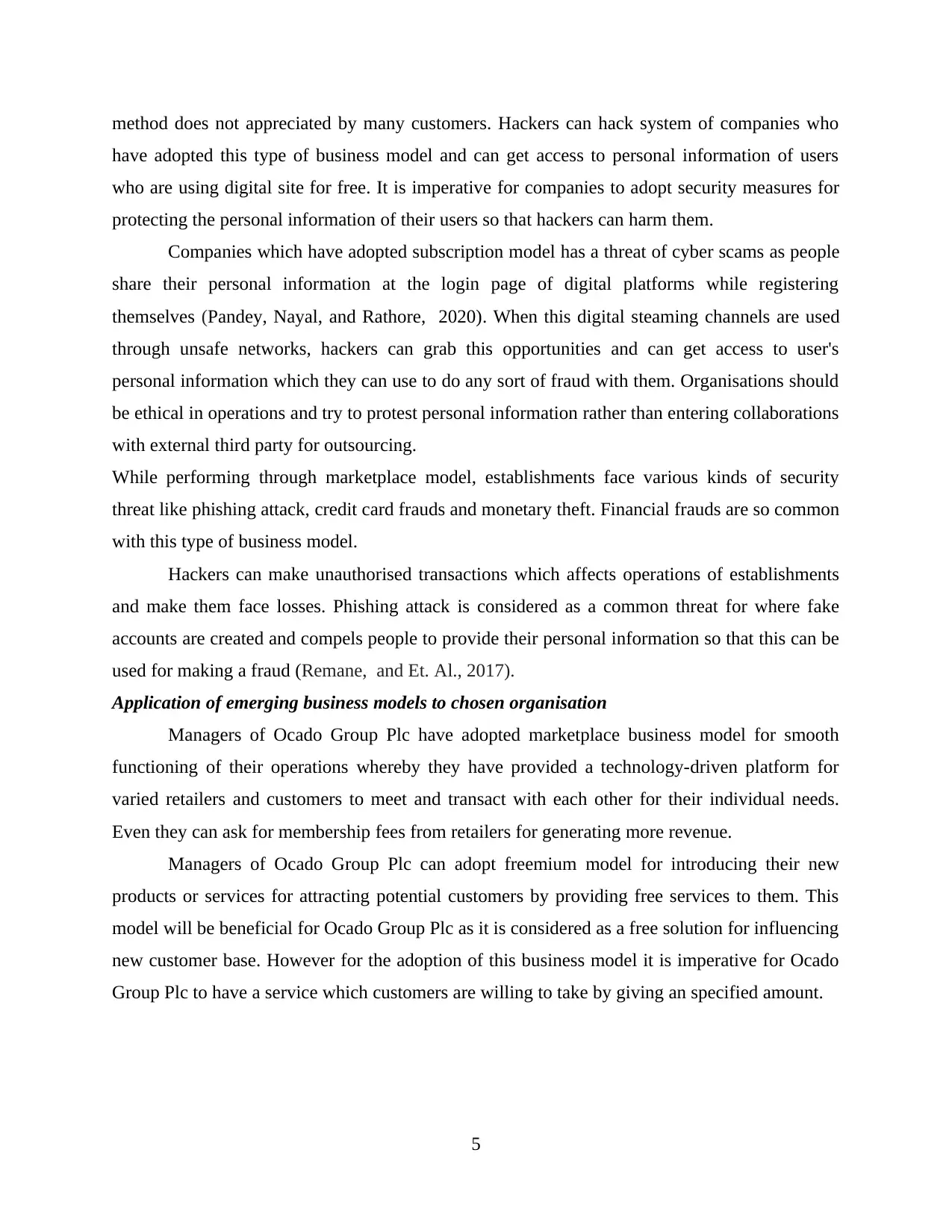
method does not appreciated by many customers. Hackers can hack system of companies who
have adopted this type of business model and can get access to personal information of users
who are using digital site for free. It is imperative for companies to adopt security measures for
protecting the personal information of their users so that hackers can harm them.
Companies which have adopted subscription model has a threat of cyber scams as people
share their personal information at the login page of digital platforms while registering
themselves (Pandey, Nayal, and Rathore, 2020). When this digital steaming channels are used
through unsafe networks, hackers can grab this opportunities and can get access to user's
personal information which they can use to do any sort of fraud with them. Organisations should
be ethical in operations and try to protest personal information rather than entering collaborations
with external third party for outsourcing.
While performing through marketplace model, establishments face various kinds of security
threat like phishing attack, credit card frauds and monetary theft. Financial frauds are so common
with this type of business model.
Hackers can make unauthorised transactions which affects operations of establishments
and make them face losses. Phishing attack is considered as a common threat for where fake
accounts are created and compels people to provide their personal information so that this can be
used for making a fraud (Remane, and Et. Al., 2017).
Application of emerging business models to chosen organisation
Managers of Ocado Group Plc have adopted marketplace business model for smooth
functioning of their operations whereby they have provided a technology-driven platform for
varied retailers and customers to meet and transact with each other for their individual needs.
Even they can ask for membership fees from retailers for generating more revenue.
Managers of Ocado Group Plc can adopt freemium model for introducing their new
products or services for attracting potential customers by providing free services to them. This
model will be beneficial for Ocado Group Plc as it is considered as a free solution for influencing
new customer base. However for the adoption of this business model it is imperative for Ocado
Group Plc to have a service which customers are willing to take by giving an specified amount.
5
have adopted this type of business model and can get access to personal information of users
who are using digital site for free. It is imperative for companies to adopt security measures for
protecting the personal information of their users so that hackers can harm them.
Companies which have adopted subscription model has a threat of cyber scams as people
share their personal information at the login page of digital platforms while registering
themselves (Pandey, Nayal, and Rathore, 2020). When this digital steaming channels are used
through unsafe networks, hackers can grab this opportunities and can get access to user's
personal information which they can use to do any sort of fraud with them. Organisations should
be ethical in operations and try to protest personal information rather than entering collaborations
with external third party for outsourcing.
While performing through marketplace model, establishments face various kinds of security
threat like phishing attack, credit card frauds and monetary theft. Financial frauds are so common
with this type of business model.
Hackers can make unauthorised transactions which affects operations of establishments
and make them face losses. Phishing attack is considered as a common threat for where fake
accounts are created and compels people to provide their personal information so that this can be
used for making a fraud (Remane, and Et. Al., 2017).
Application of emerging business models to chosen organisation
Managers of Ocado Group Plc have adopted marketplace business model for smooth
functioning of their operations whereby they have provided a technology-driven platform for
varied retailers and customers to meet and transact with each other for their individual needs.
Even they can ask for membership fees from retailers for generating more revenue.
Managers of Ocado Group Plc can adopt freemium model for introducing their new
products or services for attracting potential customers by providing free services to them. This
model will be beneficial for Ocado Group Plc as it is considered as a free solution for influencing
new customer base. However for the adoption of this business model it is imperative for Ocado
Group Plc to have a service which customers are willing to take by giving an specified amount.
5
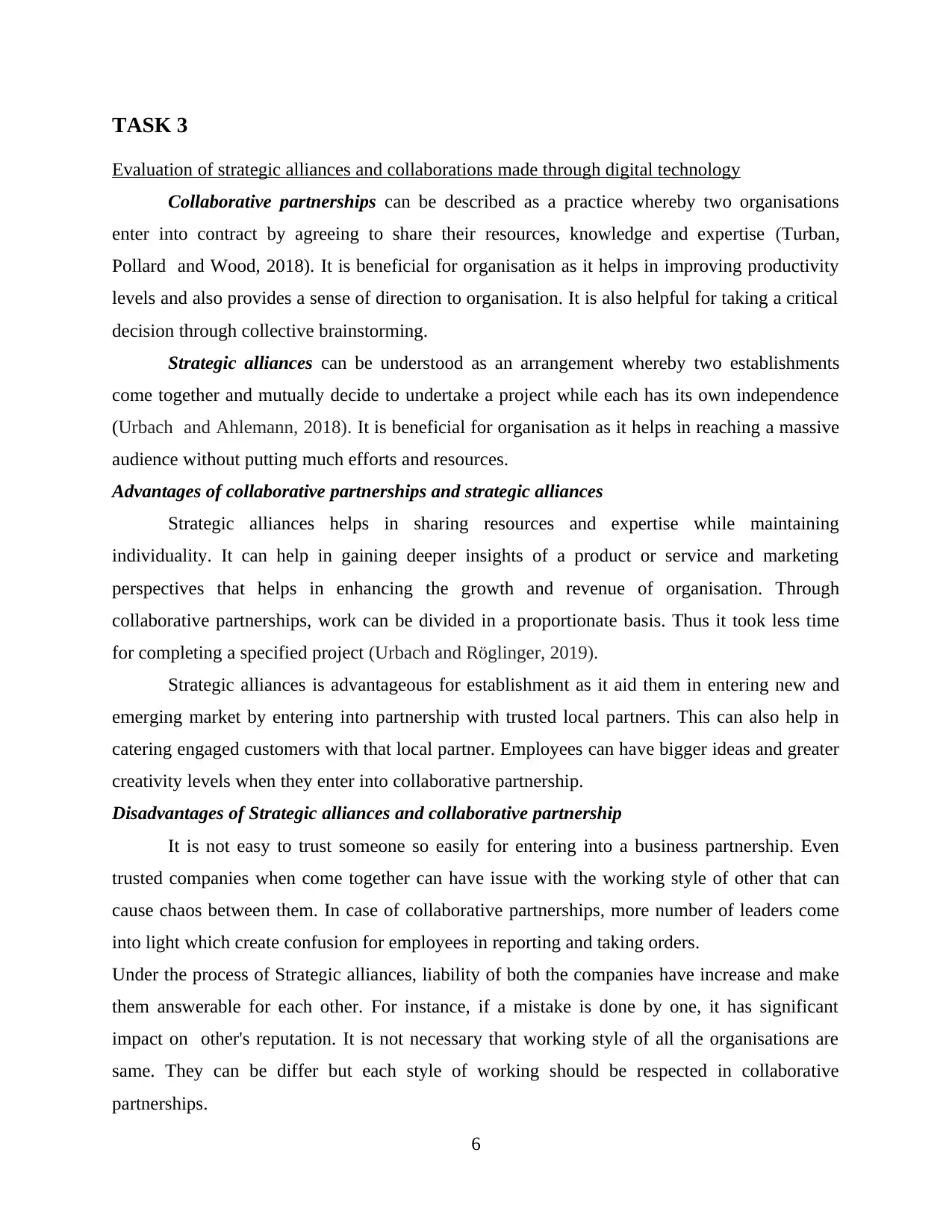
TASK 3
Evaluation of strategic alliances and collaborations made through digital technology
Collaborative partnerships can be described as a practice whereby two organisations
enter into contract by agreeing to share their resources, knowledge and expertise (Turban,
Pollard and Wood, 2018). It is beneficial for organisation as it helps in improving productivity
levels and also provides a sense of direction to organisation. It is also helpful for taking a critical
decision through collective brainstorming.
Strategic alliances can be understood as an arrangement whereby two establishments
come together and mutually decide to undertake a project while each has its own independence
(Urbach and Ahlemann, 2018). It is beneficial for organisation as it helps in reaching a massive
audience without putting much efforts and resources.
Advantages of collaborative partnerships and strategic alliances
Strategic alliances helps in sharing resources and expertise while maintaining
individuality. It can help in gaining deeper insights of a product or service and marketing
perspectives that helps in enhancing the growth and revenue of organisation. Through
collaborative partnerships, work can be divided in a proportionate basis. Thus it took less time
for completing a specified project (Urbach and Röglinger, 2019).
Strategic alliances is advantageous for establishment as it aid them in entering new and
emerging market by entering into partnership with trusted local partners. This can also help in
catering engaged customers with that local partner. Employees can have bigger ideas and greater
creativity levels when they enter into collaborative partnership.
Disadvantages of Strategic alliances and collaborative partnership
It is not easy to trust someone so easily for entering into a business partnership. Even
trusted companies when come together can have issue with the working style of other that can
cause chaos between them. In case of collaborative partnerships, more number of leaders come
into light which create confusion for employees in reporting and taking orders.
Under the process of Strategic alliances, liability of both the companies have increase and make
them answerable for each other. For instance, if a mistake is done by one, it has significant
impact on other's reputation. It is not necessary that working style of all the organisations are
same. They can be differ but each style of working should be respected in collaborative
partnerships.
6
Evaluation of strategic alliances and collaborations made through digital technology
Collaborative partnerships can be described as a practice whereby two organisations
enter into contract by agreeing to share their resources, knowledge and expertise (Turban,
Pollard and Wood, 2018). It is beneficial for organisation as it helps in improving productivity
levels and also provides a sense of direction to organisation. It is also helpful for taking a critical
decision through collective brainstorming.
Strategic alliances can be understood as an arrangement whereby two establishments
come together and mutually decide to undertake a project while each has its own independence
(Urbach and Ahlemann, 2018). It is beneficial for organisation as it helps in reaching a massive
audience without putting much efforts and resources.
Advantages of collaborative partnerships and strategic alliances
Strategic alliances helps in sharing resources and expertise while maintaining
individuality. It can help in gaining deeper insights of a product or service and marketing
perspectives that helps in enhancing the growth and revenue of organisation. Through
collaborative partnerships, work can be divided in a proportionate basis. Thus it took less time
for completing a specified project (Urbach and Röglinger, 2019).
Strategic alliances is advantageous for establishment as it aid them in entering new and
emerging market by entering into partnership with trusted local partners. This can also help in
catering engaged customers with that local partner. Employees can have bigger ideas and greater
creativity levels when they enter into collaborative partnership.
Disadvantages of Strategic alliances and collaborative partnership
It is not easy to trust someone so easily for entering into a business partnership. Even
trusted companies when come together can have issue with the working style of other that can
cause chaos between them. In case of collaborative partnerships, more number of leaders come
into light which create confusion for employees in reporting and taking orders.
Under the process of Strategic alliances, liability of both the companies have increase and make
them answerable for each other. For instance, if a mistake is done by one, it has significant
impact on other's reputation. It is not necessary that working style of all the organisations are
same. They can be differ but each style of working should be respected in collaborative
partnerships.
6
Secure Best Marks with AI Grader
Need help grading? Try our AI Grader for instant feedback on your assignments.
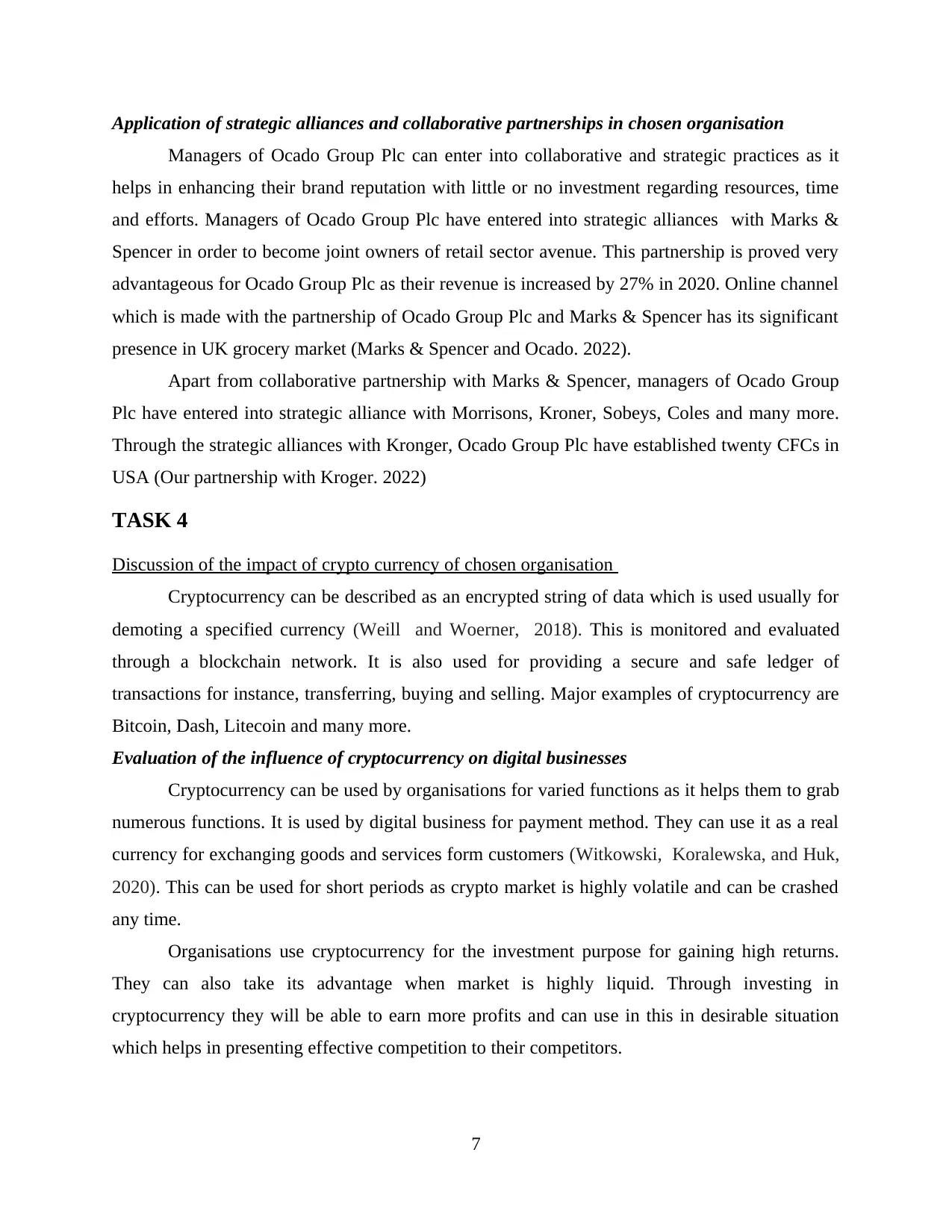
Application of strategic alliances and collaborative partnerships in chosen organisation
Managers of Ocado Group Plc can enter into collaborative and strategic practices as it
helps in enhancing their brand reputation with little or no investment regarding resources, time
and efforts. Managers of Ocado Group Plc have entered into strategic alliances with Marks &
Spencer in order to become joint owners of retail sector avenue. This partnership is proved very
advantageous for Ocado Group Plc as their revenue is increased by 27% in 2020. Online channel
which is made with the partnership of Ocado Group Plc and Marks & Spencer has its significant
presence in UK grocery market (Marks & Spencer and Ocado. 2022).
Apart from collaborative partnership with Marks & Spencer, managers of Ocado Group
Plc have entered into strategic alliance with Morrisons, Kroner, Sobeys, Coles and many more.
Through the strategic alliances with Kronger, Ocado Group Plc have established twenty CFCs in
USA (Our partnership with Kroger. 2022)
TASK 4
Discussion of the impact of crypto currency of chosen organisation
Cryptocurrency can be described as an encrypted string of data which is used usually for
demoting a specified currency (Weill and Woerner, 2018). This is monitored and evaluated
through a blockchain network. It is also used for providing a secure and safe ledger of
transactions for instance, transferring, buying and selling. Major examples of cryptocurrency are
Bitcoin, Dash, Litecoin and many more.
Evaluation of the influence of cryptocurrency on digital businesses
Cryptocurrency can be used by organisations for varied functions as it helps them to grab
numerous functions. It is used by digital business for payment method. They can use it as a real
currency for exchanging goods and services form customers (Witkowski, Koralewska, and Huk,
2020). This can be used for short periods as crypto market is highly volatile and can be crashed
any time.
Organisations use cryptocurrency for the investment purpose for gaining high returns.
They can also take its advantage when market is highly liquid. Through investing in
cryptocurrency they will be able to earn more profits and can use in this in desirable situation
which helps in presenting effective competition to their competitors.
7
Managers of Ocado Group Plc can enter into collaborative and strategic practices as it
helps in enhancing their brand reputation with little or no investment regarding resources, time
and efforts. Managers of Ocado Group Plc have entered into strategic alliances with Marks &
Spencer in order to become joint owners of retail sector avenue. This partnership is proved very
advantageous for Ocado Group Plc as their revenue is increased by 27% in 2020. Online channel
which is made with the partnership of Ocado Group Plc and Marks & Spencer has its significant
presence in UK grocery market (Marks & Spencer and Ocado. 2022).
Apart from collaborative partnership with Marks & Spencer, managers of Ocado Group
Plc have entered into strategic alliance with Morrisons, Kroner, Sobeys, Coles and many more.
Through the strategic alliances with Kronger, Ocado Group Plc have established twenty CFCs in
USA (Our partnership with Kroger. 2022)
TASK 4
Discussion of the impact of crypto currency of chosen organisation
Cryptocurrency can be described as an encrypted string of data which is used usually for
demoting a specified currency (Weill and Woerner, 2018). This is monitored and evaluated
through a blockchain network. It is also used for providing a secure and safe ledger of
transactions for instance, transferring, buying and selling. Major examples of cryptocurrency are
Bitcoin, Dash, Litecoin and many more.
Evaluation of the influence of cryptocurrency on digital businesses
Cryptocurrency can be used by organisations for varied functions as it helps them to grab
numerous functions. It is used by digital business for payment method. They can use it as a real
currency for exchanging goods and services form customers (Witkowski, Koralewska, and Huk,
2020). This can be used for short periods as crypto market is highly volatile and can be crashed
any time.
Organisations use cryptocurrency for the investment purpose for gaining high returns.
They can also take its advantage when market is highly liquid. Through investing in
cryptocurrency they will be able to earn more profits and can use in this in desirable situation
which helps in presenting effective competition to their competitors.
7
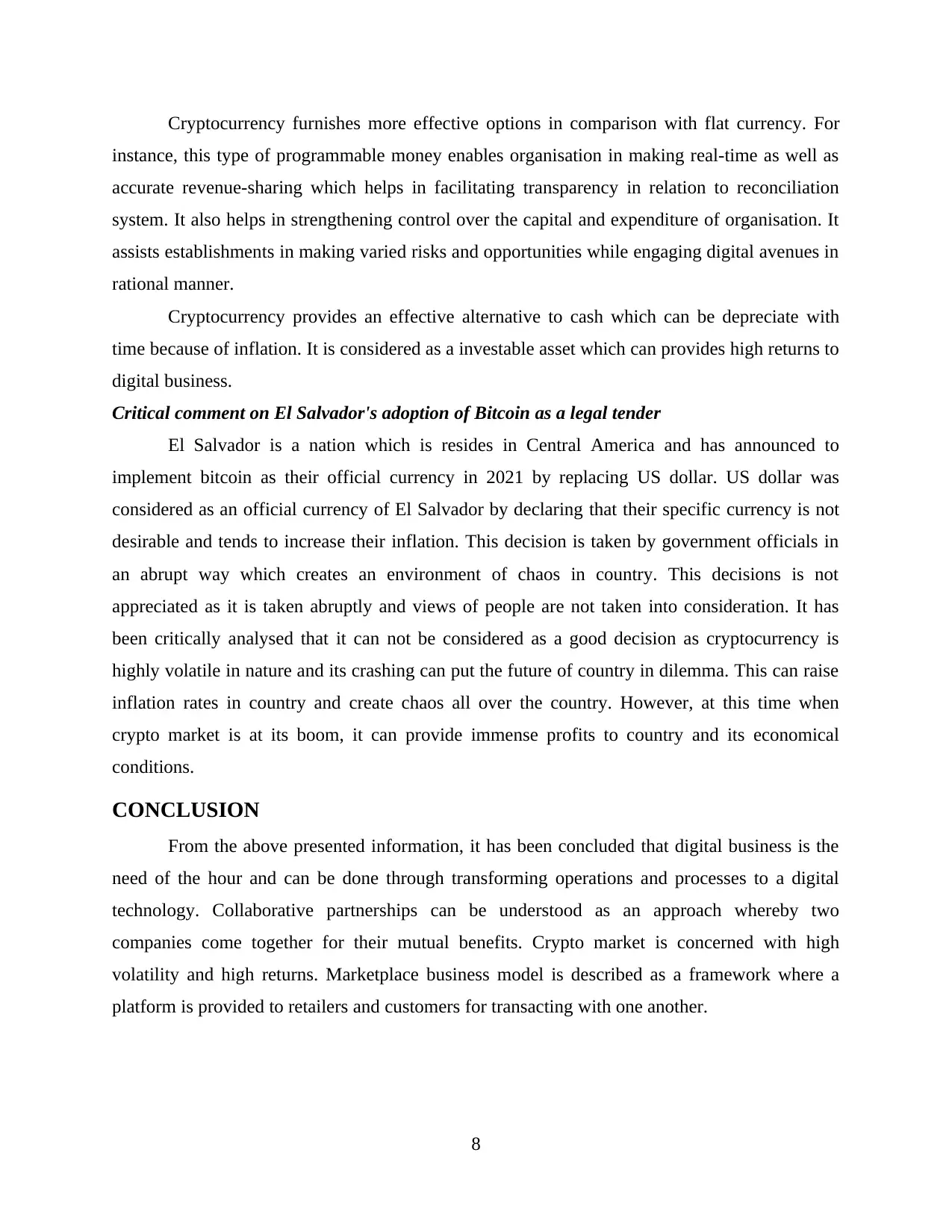
Cryptocurrency furnishes more effective options in comparison with flat currency. For
instance, this type of programmable money enables organisation in making real-time as well as
accurate revenue-sharing which helps in facilitating transparency in relation to reconciliation
system. It also helps in strengthening control over the capital and expenditure of organisation. It
assists establishments in making varied risks and opportunities while engaging digital avenues in
rational manner.
Cryptocurrency provides an effective alternative to cash which can be depreciate with
time because of inflation. It is considered as a investable asset which can provides high returns to
digital business.
Critical comment on El Salvador's adoption of Bitcoin as a legal tender
El Salvador is a nation which is resides in Central America and has announced to
implement bitcoin as their official currency in 2021 by replacing US dollar. US dollar was
considered as an official currency of El Salvador by declaring that their specific currency is not
desirable and tends to increase their inflation. This decision is taken by government officials in
an abrupt way which creates an environment of chaos in country. This decisions is not
appreciated as it is taken abruptly and views of people are not taken into consideration. It has
been critically analysed that it can not be considered as a good decision as cryptocurrency is
highly volatile in nature and its crashing can put the future of country in dilemma. This can raise
inflation rates in country and create chaos all over the country. However, at this time when
crypto market is at its boom, it can provide immense profits to country and its economical
conditions.
CONCLUSION
From the above presented information, it has been concluded that digital business is the
need of the hour and can be done through transforming operations and processes to a digital
technology. Collaborative partnerships can be understood as an approach whereby two
companies come together for their mutual benefits. Crypto market is concerned with high
volatility and high returns. Marketplace business model is described as a framework where a
platform is provided to retailers and customers for transacting with one another.
8
instance, this type of programmable money enables organisation in making real-time as well as
accurate revenue-sharing which helps in facilitating transparency in relation to reconciliation
system. It also helps in strengthening control over the capital and expenditure of organisation. It
assists establishments in making varied risks and opportunities while engaging digital avenues in
rational manner.
Cryptocurrency provides an effective alternative to cash which can be depreciate with
time because of inflation. It is considered as a investable asset which can provides high returns to
digital business.
Critical comment on El Salvador's adoption of Bitcoin as a legal tender
El Salvador is a nation which is resides in Central America and has announced to
implement bitcoin as their official currency in 2021 by replacing US dollar. US dollar was
considered as an official currency of El Salvador by declaring that their specific currency is not
desirable and tends to increase their inflation. This decision is taken by government officials in
an abrupt way which creates an environment of chaos in country. This decisions is not
appreciated as it is taken abruptly and views of people are not taken into consideration. It has
been critically analysed that it can not be considered as a good decision as cryptocurrency is
highly volatile in nature and its crashing can put the future of country in dilemma. This can raise
inflation rates in country and create chaos all over the country. However, at this time when
crypto market is at its boom, it can provide immense profits to country and its economical
conditions.
CONCLUSION
From the above presented information, it has been concluded that digital business is the
need of the hour and can be done through transforming operations and processes to a digital
technology. Collaborative partnerships can be understood as an approach whereby two
companies come together for their mutual benefits. Crypto market is concerned with high
volatility and high returns. Marketplace business model is described as a framework where a
platform is provided to retailers and customers for transacting with one another.
8

9
Paraphrase This Document
Need a fresh take? Get an instant paraphrase of this document with our AI Paraphraser
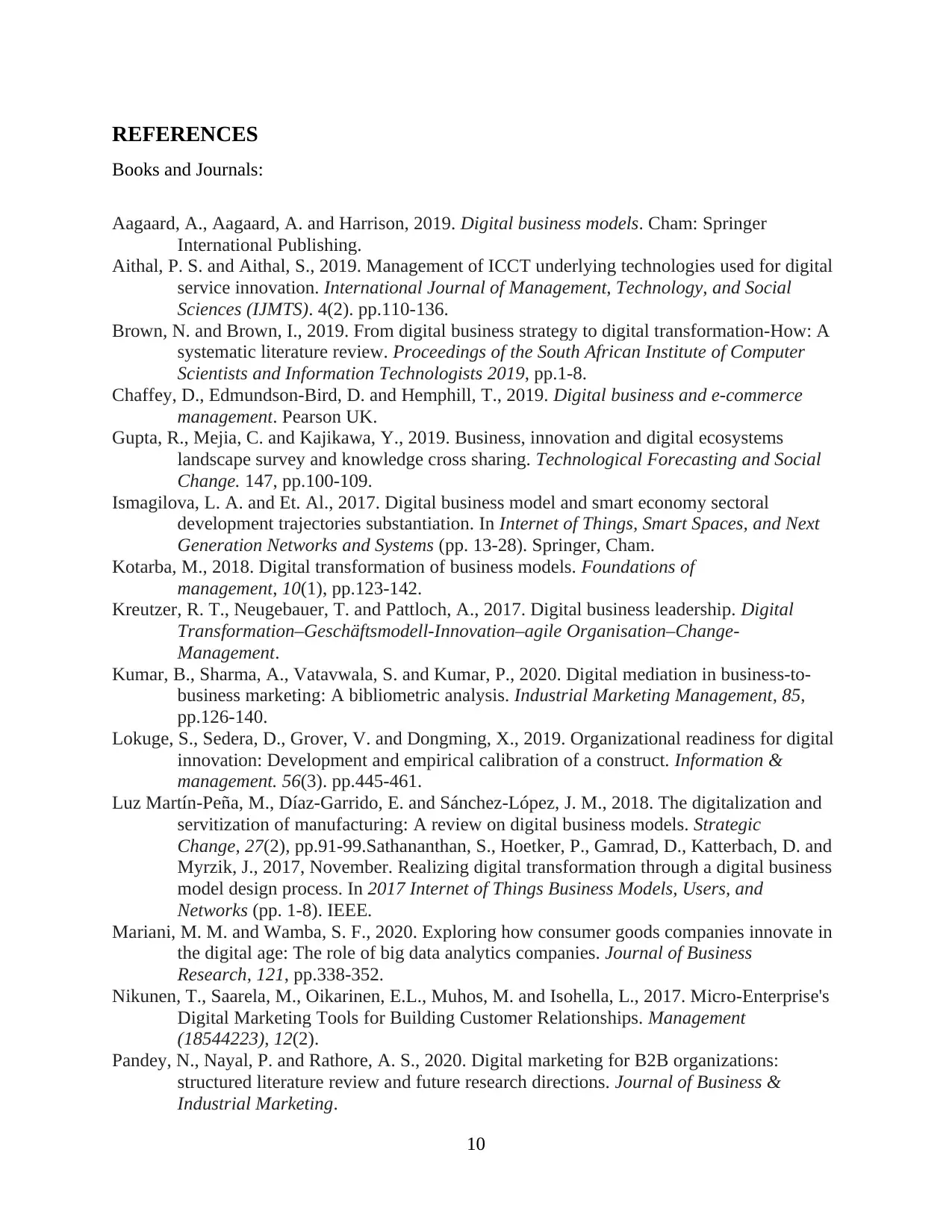
REFERENCES
Books and Journals:
Aagaard, A., Aagaard, A. and Harrison, 2019. Digital business models. Cham: Springer
International Publishing.
Aithal, P. S. and Aithal, S., 2019. Management of ICCT underlying technologies used for digital
service innovation. International Journal of Management, Technology, and Social
Sciences (IJMTS). 4(2). pp.110-136.
Brown, N. and Brown, I., 2019. From digital business strategy to digital transformation-How: A
systematic literature review. Proceedings of the South African Institute of Computer
Scientists and Information Technologists 2019, pp.1-8.
Chaffey, D., Edmundson-Bird, D. and Hemphill, T., 2019. Digital business and e-commerce
management. Pearson UK.
Gupta, R., Mejia, C. and Kajikawa, Y., 2019. Business, innovation and digital ecosystems
landscape survey and knowledge cross sharing. Technological Forecasting and Social
Change. 147, pp.100-109.
Ismagilova, L. A. and Et. Al., 2017. Digital business model and smart economy sectoral
development trajectories substantiation. In Internet of Things, Smart Spaces, and Next
Generation Networks and Systems (pp. 13-28). Springer, Cham.
Kotarba, M., 2018. Digital transformation of business models. Foundations of
management, 10(1), pp.123-142.
Kreutzer, R. T., Neugebauer, T. and Pattloch, A., 2017. Digital business leadership. Digital
Transformation–Geschäftsmodell-Innovation–agile Organisation–Change-
Management.
Kumar, B., Sharma, A., Vatavwala, S. and Kumar, P., 2020. Digital mediation in business-to-
business marketing: A bibliometric analysis. Industrial Marketing Management, 85,
pp.126-140.
Lokuge, S., Sedera, D., Grover, V. and Dongming, X., 2019. Organizational readiness for digital
innovation: Development and empirical calibration of a construct. Information &
management. 56(3). pp.445-461.
Luz Martín‐Peña, M., Díaz‐Garrido, E. and Sánchez‐López, J. M., 2018. The digitalization and
servitization of manufacturing: A review on digital business models. Strategic
Change, 27(2), pp.91-99.Sathananthan, S., Hoetker, P., Gamrad, D., Katterbach, D. and
Myrzik, J., 2017, November. Realizing digital transformation through a digital business
model design process. In 2017 Internet of Things Business Models, Users, and
Networks (pp. 1-8). IEEE.
Mariani, M. M. and Wamba, S. F., 2020. Exploring how consumer goods companies innovate in
the digital age: The role of big data analytics companies. Journal of Business
Research, 121, pp.338-352.
Nikunen, T., Saarela, M., Oikarinen, E.L., Muhos, M. and Isohella, L., 2017. Micro-Enterprise's
Digital Marketing Tools for Building Customer Relationships. Management
(18544223), 12(2).
Pandey, N., Nayal, P. and Rathore, A. S., 2020. Digital marketing for B2B organizations:
structured literature review and future research directions. Journal of Business &
Industrial Marketing.
10
Books and Journals:
Aagaard, A., Aagaard, A. and Harrison, 2019. Digital business models. Cham: Springer
International Publishing.
Aithal, P. S. and Aithal, S., 2019. Management of ICCT underlying technologies used for digital
service innovation. International Journal of Management, Technology, and Social
Sciences (IJMTS). 4(2). pp.110-136.
Brown, N. and Brown, I., 2019. From digital business strategy to digital transformation-How: A
systematic literature review. Proceedings of the South African Institute of Computer
Scientists and Information Technologists 2019, pp.1-8.
Chaffey, D., Edmundson-Bird, D. and Hemphill, T., 2019. Digital business and e-commerce
management. Pearson UK.
Gupta, R., Mejia, C. and Kajikawa, Y., 2019. Business, innovation and digital ecosystems
landscape survey and knowledge cross sharing. Technological Forecasting and Social
Change. 147, pp.100-109.
Ismagilova, L. A. and Et. Al., 2017. Digital business model and smart economy sectoral
development trajectories substantiation. In Internet of Things, Smart Spaces, and Next
Generation Networks and Systems (pp. 13-28). Springer, Cham.
Kotarba, M., 2018. Digital transformation of business models. Foundations of
management, 10(1), pp.123-142.
Kreutzer, R. T., Neugebauer, T. and Pattloch, A., 2017. Digital business leadership. Digital
Transformation–Geschäftsmodell-Innovation–agile Organisation–Change-
Management.
Kumar, B., Sharma, A., Vatavwala, S. and Kumar, P., 2020. Digital mediation in business-to-
business marketing: A bibliometric analysis. Industrial Marketing Management, 85,
pp.126-140.
Lokuge, S., Sedera, D., Grover, V. and Dongming, X., 2019. Organizational readiness for digital
innovation: Development and empirical calibration of a construct. Information &
management. 56(3). pp.445-461.
Luz Martín‐Peña, M., Díaz‐Garrido, E. and Sánchez‐López, J. M., 2018. The digitalization and
servitization of manufacturing: A review on digital business models. Strategic
Change, 27(2), pp.91-99.Sathananthan, S., Hoetker, P., Gamrad, D., Katterbach, D. and
Myrzik, J., 2017, November. Realizing digital transformation through a digital business
model design process. In 2017 Internet of Things Business Models, Users, and
Networks (pp. 1-8). IEEE.
Mariani, M. M. and Wamba, S. F., 2020. Exploring how consumer goods companies innovate in
the digital age: The role of big data analytics companies. Journal of Business
Research, 121, pp.338-352.
Nikunen, T., Saarela, M., Oikarinen, E.L., Muhos, M. and Isohella, L., 2017. Micro-Enterprise's
Digital Marketing Tools for Building Customer Relationships. Management
(18544223), 12(2).
Pandey, N., Nayal, P. and Rathore, A. S., 2020. Digital marketing for B2B organizations:
structured literature review and future research directions. Journal of Business &
Industrial Marketing.
10
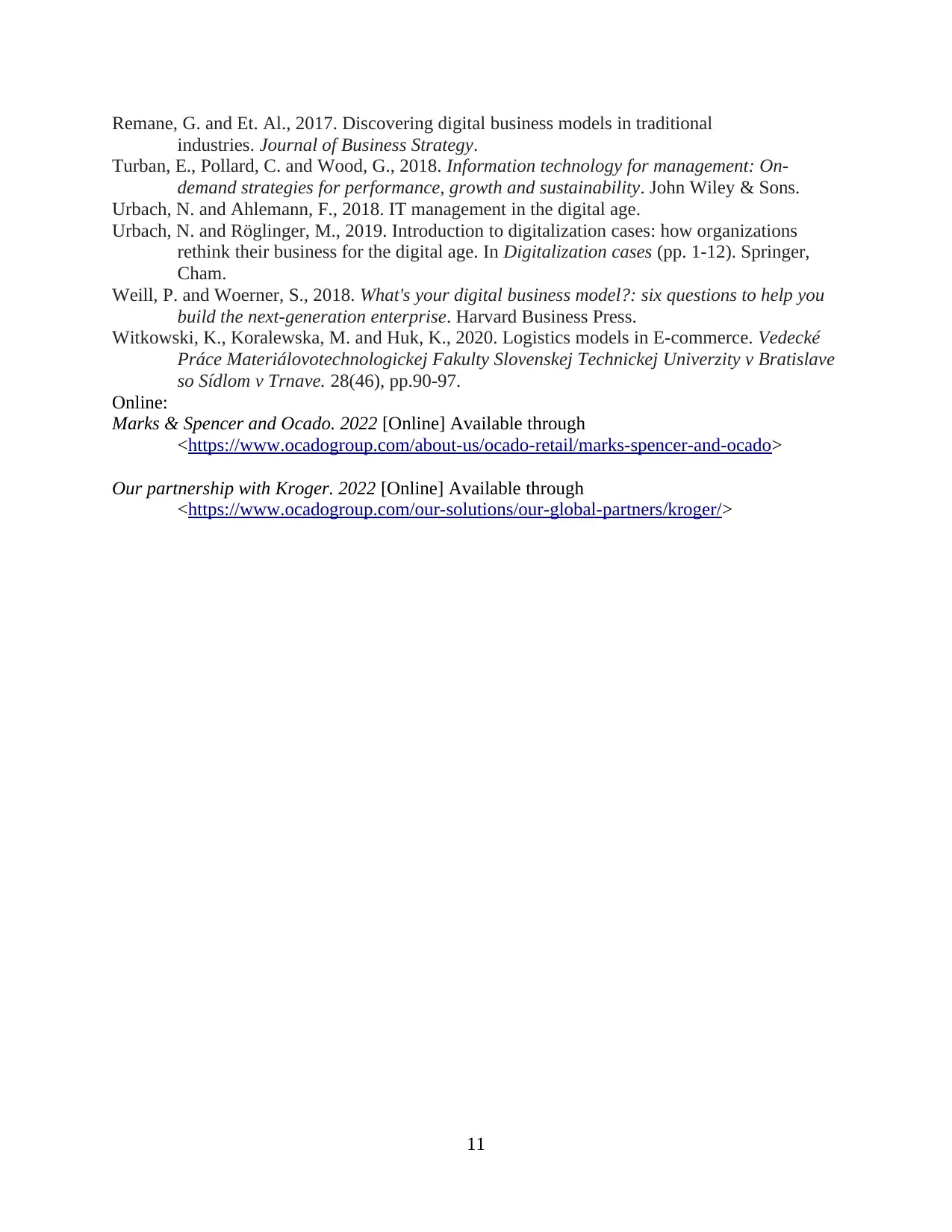
Remane, G. and Et. Al., 2017. Discovering digital business models in traditional
industries. Journal of Business Strategy.
Turban, E., Pollard, C. and Wood, G., 2018. Information technology for management: On-
demand strategies for performance, growth and sustainability. John Wiley & Sons.
Urbach, N. and Ahlemann, F., 2018. IT management in the digital age.
Urbach, N. and Röglinger, M., 2019. Introduction to digitalization cases: how organizations
rethink their business for the digital age. In Digitalization cases (pp. 1-12). Springer,
Cham.
Weill, P. and Woerner, S., 2018. What's your digital business model?: six questions to help you
build the next-generation enterprise. Harvard Business Press.
Witkowski, K., Koralewska, M. and Huk, K., 2020. Logistics models in E-commerce. Vedecké
Práce Materiálovotechnologickej Fakulty Slovenskej Technickej Univerzity v Bratislave
so Sídlom v Trnave. 28(46), pp.90-97.
Online:
Marks & Spencer and Ocado. 2022 [Online] Available through
<https://www.ocadogroup.com/about-us/ocado-retail/marks-spencer-and-ocado>
Our partnership with Kroger. 2022 [Online] Available through
<https://www.ocadogroup.com/our-solutions/our-global-partners/kroger/>
11
industries. Journal of Business Strategy.
Turban, E., Pollard, C. and Wood, G., 2018. Information technology for management: On-
demand strategies for performance, growth and sustainability. John Wiley & Sons.
Urbach, N. and Ahlemann, F., 2018. IT management in the digital age.
Urbach, N. and Röglinger, M., 2019. Introduction to digitalization cases: how organizations
rethink their business for the digital age. In Digitalization cases (pp. 1-12). Springer,
Cham.
Weill, P. and Woerner, S., 2018. What's your digital business model?: six questions to help you
build the next-generation enterprise. Harvard Business Press.
Witkowski, K., Koralewska, M. and Huk, K., 2020. Logistics models in E-commerce. Vedecké
Práce Materiálovotechnologickej Fakulty Slovenskej Technickej Univerzity v Bratislave
so Sídlom v Trnave. 28(46), pp.90-97.
Online:
Marks & Spencer and Ocado. 2022 [Online] Available through
<https://www.ocadogroup.com/about-us/ocado-retail/marks-spencer-and-ocado>
Our partnership with Kroger. 2022 [Online] Available through
<https://www.ocadogroup.com/our-solutions/our-global-partners/kroger/>
11
1 out of 15
Related Documents
Your All-in-One AI-Powered Toolkit for Academic Success.
+13062052269
info@desklib.com
Available 24*7 on WhatsApp / Email
![[object Object]](/_next/static/media/star-bottom.7253800d.svg)
Unlock your academic potential
© 2024 | Zucol Services PVT LTD | All rights reserved.




